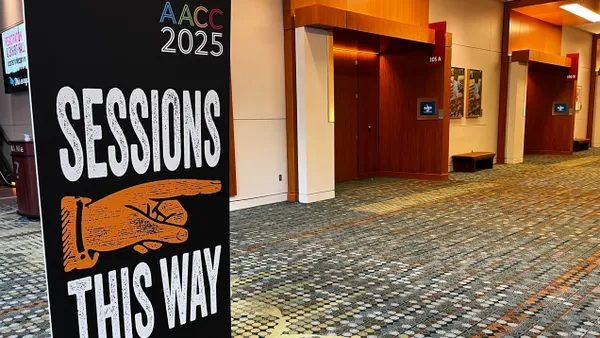Dive Brief:
- Student lists from providers like the College Board and the ACT systematically exclude underrepresented students, according to a series of reports released Wednesday by The Institute for College Access & Success.
- Researchers found list search filters, which allow colleges to select which demographics of students they buy information on, disproportionately exclude students from low-income and rural communities, as well as communities of color.
- Whether a student allows their information to be sold also affects college access outcomes for millions of students, researchers found. Among students with the same SAT score, parental education, race/ethnicity and gender who graduated from the same high school, 41.1% of those who opted to allow one testing provider to license their information to colleges attended a four-year institution. That's compared to 32.8% of students who opted out. The difference was even higher for students from historically excluded backgrounds.
Dive Insight:
Colleges typically buy information about students from standardized testing providers in an effort to find those who will meet their admissions criteria. The College Board draws information from products like the SAT and Advance Placement tests that it licenses to colleges under its Student Search Service.The ACT platform works similarly.
Colleges can filter students using metrics like test score range, high school GPA and race. And, while the College Board says its Search program does not allow colleges to filter by income, a person's ZIP code and level of affluence are closely correlated with their earnings.
This ability to zoom in on what type of student a college is looking for is often to the detriment of high schoolers who appear unlikely on paper to move on to higher ed, TICAS said. This is especially true when multiple criteria are used.
Such lists also allow colleges to get in front of prospective students en masse in a cost-effective manner.
In 2020, one university reported purchasing a combined 1.25 million student names from the College Board and ACT at a cost of 47 cents each. The average private university spent 14% of its recruiting budget on student lists, second only to off-campus recruiting visits at 17%, according to the report.
Researchers collected student list purchase data from every public university in four states — California, Illinois, Minnesota and Texas — using public records requests.
In response to the report, the College Board said institutions that use its Search program agree to not discriminate against any group of students. If an organization does not follow the policies, the College Board said it will terminate its sharing agreement.
The nonprofit testing provider also said all students can participate in Search, not just those who take its tests.
"In fact, more than half of students who opted-in this year did so outside of the assessment experience," College Board said in a statement Thursday. "As the researchers point out themselves, many colleges use Search specifically to reach underrepresented students and increase equity in educational opportunity."
The ACT did not immediately respond to a request for comment Thursday.
Student list products are also facing an uncertain future, as colleges increasingly make standardized tests optional or remove them from the admissions process altogether. In turn, fewer high school students will take the SAT or ACT exams, TICAS said, leaving gaps in student lists' coverage.
If colleges continue to rely on student lists, it could leave them unable to identify and contact large swaths of prospective students, researchers said.














